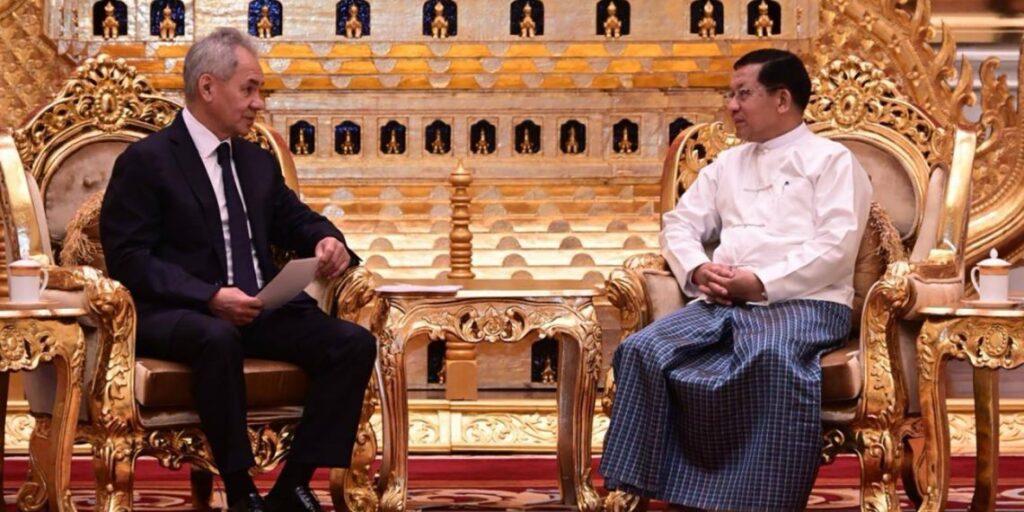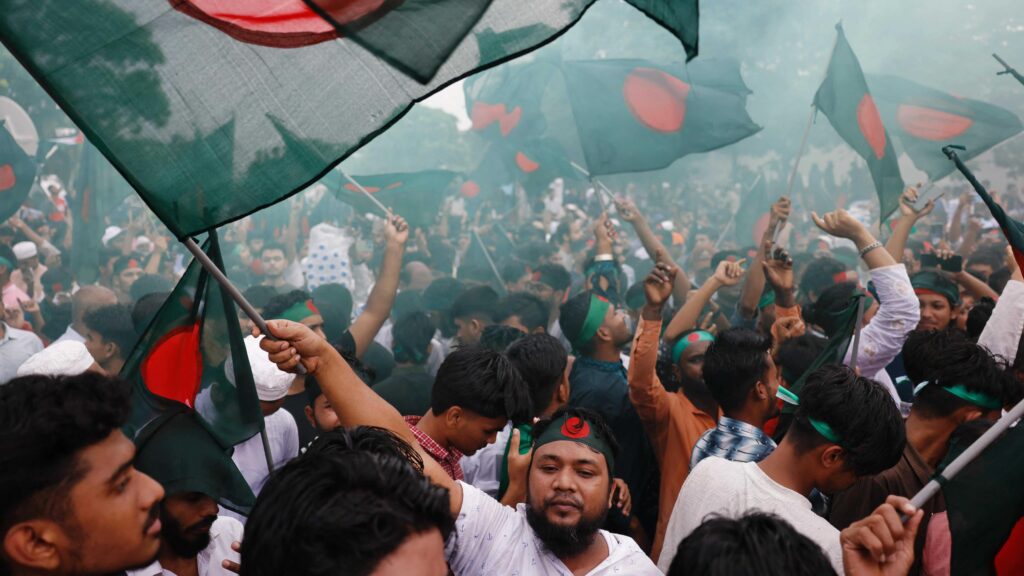MANTRAYA ANALYSIS#17: 28 SEPTEMBER 2017
BIBHU PRASAD ROUTRAY
Abstract
The Rohingya in Myanmar, with their poverty and limited economic opportunities, seek only to live with dignity, free from fear of attack. Given the Myanmar military is not inclined to stop its persecution and the civilian government is ill placed to intervene, the crisis can be brought to an end only if international actors step in.
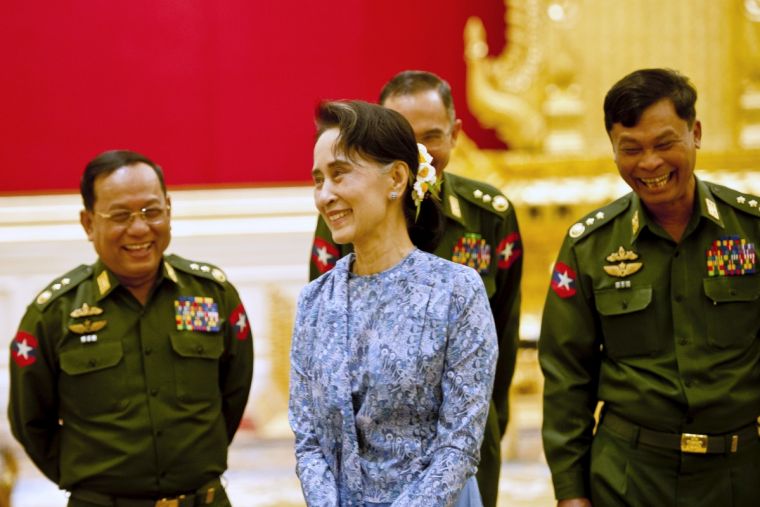
(Aung San Suu Kyi with army members during the handover ceremony
of former President Thein Sein on 30 March 2016. Photo: Reuters)
The battery of accusations targeting Aung San Suu Kyi in the international media appears to believe she holds the key to resolving the Rohingya conflict in Myanmar. The expectation was that she would speak sympathetically on the plight of the millions and use her influential position to order the military to endits brutal counter-terrorism operation directed ostensibly against the Arakan Rohingya Salvation Army (ARSA) to a halt. It was further expected that she would ask the Buddhist nationalists in her country to accept the Rohingya as fellow countrymen. This has all come to naught. The reality is that while she could have sought to inspire action on humanitarian concerns, befitting her own international image as a crusader for democratic rights,such moves would not have had much impact.For the solution to the Rohingya miseries does not lie in Myanmar but in the regional and global pressure that must be brought to bear upon the Myanmar military to end its ethnic cleansing.
A Power Centre That Won’t Act
So here is a power centre which harbours deep antipathy towards the ethnic minorities, with the Rohingya twice cursed, being both ethnically and religiously a minority.
Politics is starkly different from idealistic expectations. In Myanmar, as with the state of civil-military relations in Pakistan, the civilian government is in uncomfortable cohabitation with the military. The Tatmadaw (as the military is known in Burmese) not only occupies 25 percent of the seats in both houses of parliament and the provincial assemblies but also has the constitutional mandate to control three key ministries (Home, Border Affairs, and Defence). While there has been a civilian government in place since the 2015 parliamentary elections, it is the military which decides and implements all of Myanmar’s national security functions. Tatmadaw also controls the judiciary and has a huge presence in business and economic activity, making it an untouchable giant – with no attempt needed to conceal its influence.
All those who expect the military to heed international calls to top its brutal military campaign, which the United Nations high commissioner for human rights described as ethnic cleansing, against the Rohingya would do well to note the following facts. First, it was the military’s promulgation of the Nationality Law in 1982 which unilaterally removed the Rohingya from the list of Myanmar’s citizens. Second, the same Tatmadawhas since 2012 joined hands with Buddhist nationalist groups such as the MabaTha movement to persecute the Rohingya. And third, planting mines along the border with Bangladesh which has led to injuries and maiming of the fleeing Rohingya, is also the Tatmadaw’s work.
So here is a power centre which harbours deep antipathy towards the ethnic minorities, with the Rohingya twice cursed, being both ethnically and religiously a minority. On the surface, it claims to link its operations to a reaction against the attacks carried out by the ARSA and its predecessor, the HAY, in October 2016 and August 2017. In reality, what is happening is of a piece with the Tatmadaw’s history of unceasing operations against ethnic groups such as the Kachins, the Kokangs and the Shans. These have sought to portray them as less-than-human and have, to the Burmese mind, demonstrated the effectiveness of a scorched earth policy. While periods prior to the 2012 peace negotiations with some of the ethnic armies by the quasi-democratic regime headed by President Thein Sein involved policies of coopting them as border guards, for the Rohingya, who do not qualify to be Myanmar’s citizens, only a brutal policy of collective punishment has been advanced.
A Power Centre That Can’t Act
Politicians are prisoners of their own ambitions, and Suu Kyi is not demonstrably different different. Politicians are prisoners of their own ambitions, and Suu Kyi is not demonstrably different different.
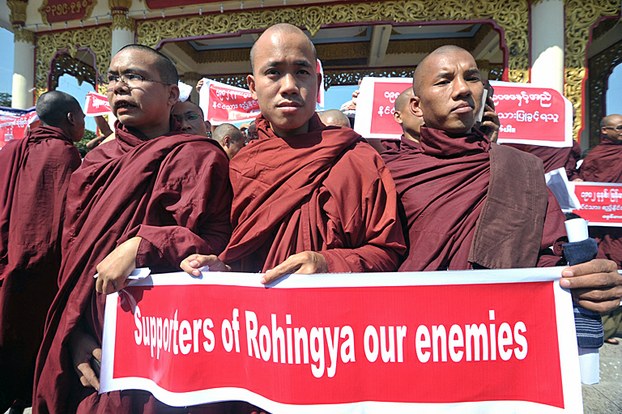
(Myanmar Buddhist monks display a banner during a protest against
visiting U.N. Special Rapporteur on Myanmar in Yangon, 16 January 2014, Photo: AFP)
This is not to claim that the civilians do not have their own power. The 2015 parliamentary and state elections were swept by Suu Kyi’s National League for Democracy (NLD). The overwhelming results even drowned the military’s front organization, the Union Solidarity and Development Party (USDP). Such an overwhelming mandate not only enabled Suu Kyi to form a government of her choice at the centre and at the state level, in some cases by completely sidelining the ethnic groups, but also to create a special position for herself as a state counsellor, a position higher than the President. She was also able to gain political power as a state counsellor, minister of foreign affairs, minister who oversees peace with the ethnic insurgencies, and special minister in charge of Rakhine affairs. All of this, vested in a single person, is a contravention of democratic norms but provides stature in the eyes of her domestic audience. Many appear to believe that she deserves such positioning as compensation for her long periods of incarceration. She remains their best bet vis-a-vis the military.
Even such power has limits, though. Her attempts to coopt the military to support constitutional amendments and co control the Buddhist nationalists, who for long have rallied popular sentiments around the non-existent threat to their faith purportedly posed by the Muslims, have been unsuccessful. Neither have her moves to bring the Tatmadaw’s wars against the Kachins, the Kokangs and the Shan State Army-South (SSA-South) succeeded. The national reconciliation project remains stuck, as is the grand design of arriving at a national ceasefire agreement with all the insurgent movements.
With regard to the Rohingya, she realizes that pushing either of the two powerful camps discussed above can disrupt her own position and project. They, in fact, have much in common, to include being opposed to the Rohingya and the ethnic insurgencies. Politicians are prisoners of their own ambitions, and Suu Kyi is not demonstrably different different. It is thus not a surprise that she has been prominent in the public denial of the military’s ethnic cleansing program and has not shied away from accusing international agencies, such as the World Food Programme, of supporting the ‘ARSA terrorists’. Negative media reportage might have affected her image internationally, but her domestic appeal among the Bamar majority remains firm and unshaken.
Is There An End In Sight?
Rohingya misery can end only if regional and global powers rediscover their roles not only as defenders of human rights but also as beneficiaries of the economic opportunities provided by a stable Myanmar.
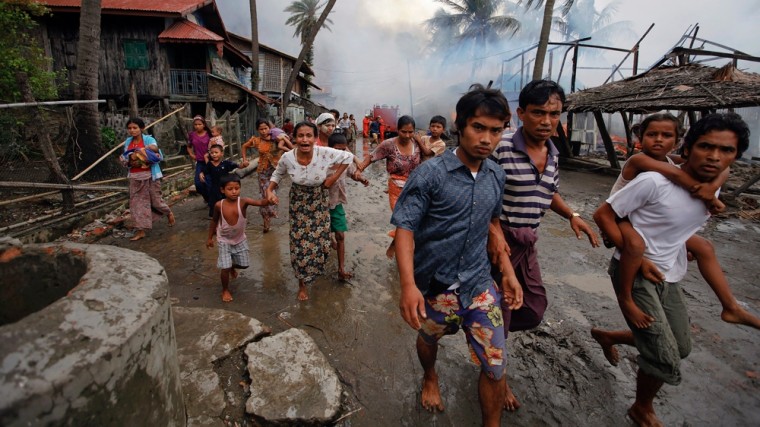
(Rohingya leave their village after their homes were set afire in Rakhine state, Photo: Aljazeera)
In the absence of domestic incentive and initiative, the Rohingya misery can end only if regional and global powers rediscover their roles not only as defenders of human rights but also as beneficiaries of the economic opportunities provided by a stable Myanmar. Till now, the location of the conflict in a peripheral region bordering Bangladesh is not seen as a source of destabilisation by either the domestic power centres or by the regional or global countries. While Bangladesh is left to bear the responsibility of providing shelter and aid to the hundreds of thousands who have poured into its territory, countries such as India and China have chosen to support the Tatmadaw. India has even gone a step further by declaring its intentions to deport the 40,000 Rohingya who have entered its territory since 2012.
Yet the emergence of ARSA is a turning point. Before October 2016, few focused upon the possibility that the persecution of the Rohingya would likely open up the space necessary for the emergence of a Jihadist insurgency. In a pattern normally associated with the history of the conflict in the Thai south, the early attacks on the security forces by the HAY involved crude weapons such as machetes and slingshots. Subsequently. ARSA has grown in numbers and efficiency. The August 2017 attacks demonstrated its capacity to use IEDs and carry out well-organised ambushes,supported by a reservoir of popular self-defense sentiment.
From such a position, with external assistance, the movement can only growas it gives a sense of purpose and protection to the helpless victims. Myanmar apparently has learned nothing from the analogous pattern in Sri Lanka in the early days of the Eelam wars. To the contrary, the Tatmadaw has simply continued its default approach of terrorising another minority population. But its continued persecution will only add to ARSA’s appeal. The battlefield will then likely expand beyond the periphery of the Rakhine state and affect Myanmar’s stability. It is this future scenario which should worry friendly foreign nations, if they are not moved to act simply by the sheer scale and drama of Rohingya suffering.
Tragically, what the persecuted Rohingya masses desire is hardly a project requiring massive influx of resources or power. Whatever their poverty and limited economic opportunities, they seek only to live with dignity, free from fear of attack. If such a simple poignant vision cannot be enabled by Myanmar’s military and its civilian rulers, international actors must step in.
(Bibhu Prasad Routray is the Director of MISS and is currently a Visiting Professor and India Chair at Murdoch University, Perth (Australia). All Mantraya publications are peer-reviewed.)


